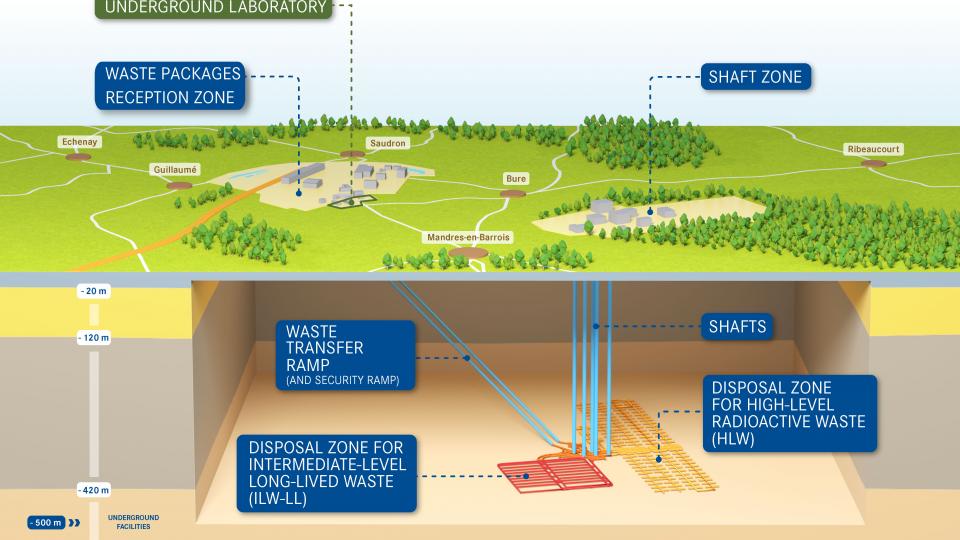 France's Autorité de Sûreté Nucléaire (ASN – Nuclear Safety Authority) is to start technical examination of the file related to the planned Cigéo deep geological disposal facility. The National Radioactive Waste Management Agency (Andra) submitted the creation authorisation application (DAC - Demande d’Autorisation de Création) to the Ministry for Energy Transition in January. The 10,000-page application, effectively requesting a construction licence, comprises 23 key documents.
France's Autorité de Sûreté Nucléaire (ASN – Nuclear Safety Authority) is to start technical examination of the file related to the planned Cigéo deep geological disposal facility. The National Radioactive Waste Management Agency (Andra) submitted the creation authorisation application (DAC - Demande d’Autorisation de Création) to the Ministry for Energy Transition in January. The 10,000-page application, effectively requesting a construction licence, comprises 23 key documents.
ASN said it considers that the Cigéo DAC file is “admissible” and will initiate its technical examination. The DAC “will be examined according to procedures adapted to the exceptional nature of this project , involving in particular the IRSN [Institute for Radiation Protection & Nuclear Safety], the ASN permanent groups of experts and the National Evaluation Commission. The results of this work will be presented to Parliament.”
Cigéo is sited on the border between the Meuse and Haute-Marne departments of France and is designed to dispose of the highest levels of radioactive waste at a depth of 500 metres in a geological layer which has been stable for several million years. This project is the outcome of over 30 years of research by Andra with the support of researchers from the national and international scientific community, including 20 years of on-site scientific experiments in Andra’s Underground laboratory. The Cigéo project was supported by three acts voted in 1991, 2006 and 2016, and two public debates in 2005 and 2013. Andra says Cigeo represents a disposal solution for 83,000 cubic metres of medium and low-level long-lived radioactive waste, half of which is already produced.
According to ASN, the filing of the DAC “marks a major step in the development of the project”. It “is the culmination of several decades of preliminary research and development work relating to various issues such as the choice of site, the development of key components of the installation, or its main safety options”. This preliminary work was subjected to technical reviews by ASN supported by IRSN.
At the request in March of the Ministry for Energy Transition, ASN first looked at the admissibility of the dossier and concluded that it included “the elements necessary to initiate the work of analysis and expertise which is at the heart of the investigation procedure”. This “marks the start of the file examination procedure” starting with a technical examination expected to take three years. The procedure comprises two essential phases, the technical examination and the consultations.
The technical examination, led by ASN, must ensure that the project “presents all the guarantees necessary to meet the safety requirements applicable to it”. ASN has called on IRSN to conduct an expert appraisal of all the documents in the file, and plans to mobilise its standing group of experts for waste (GPD), as well as its permanent experts for factories (GPU), to look at three issues:
- the basic assumptions and data used in the file;
- safety during the operating phases of the facility; and
- long-term safety, after the closure of Cigéo.
In parallel with this technical investigation, National Evaluation Commission will draw up an opinion on the file, which will be sent to Parliament. “The Commission will base its opinion on the scientific content of the file and on its knowledge of the state of the art, fed by its mission of annual evaluation of the progress of research and studies relating to the management of materials and radioactive waste,” ASN noted.
Following the technical investigation, there will be a consultation involving all the institutional players (environmental authority, local information commission, local water commission, local authorities, and the European Commission), and a public inquiry. Assuming all of these conclude favourably on the acceptability of the project, development of the authorisation decree for the installation will be initiated.
ASN has set up a specific mechanism for public consultation and information. This “aims to ensure that the main expectations of the stakeholders are properly taken into account, and to share, throughout the investigation work, regular and complete information on the progress of the examination of the file”.
ASN has allowed five years overall to study Andra's file ending with the public inquiry, expected towards the end of 2026. If ASN's final opinion is positive, the authorisation decree will be issued enabling Andra to start construction of the first section of Cigéo.
In this case, Andra will launch construction in 2027 leading to a pilot phase with the first cold tests. This will take the form of a “small pilot district” with around 20 cells for high-level waste out of the 900 planned and four cells out of 22 for medium-level waste. For the rest, a new authorisation will be necessary.
The first radioactive waste packages are expected in 2035 or 2040 for a pilot industrial phase planned until 2050 for medium-level, long-lived waste. High level wastes are not expected before 2085 after they cool sufficiently. Cigeo will gradually expand underground until 2150, when it closes, initiating a surveillance period of at least 300 years.
Image: The Cigeo project (courtesy of Andra)



